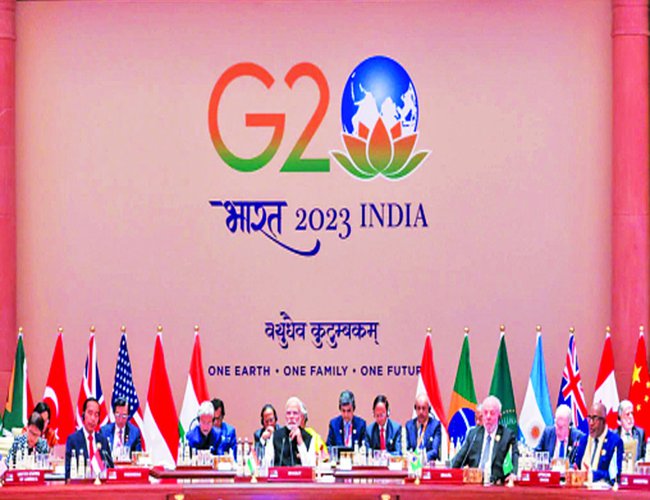
The stupendous success of the G20 New Delhi Summit and a deftly worded G20 Leaders New Delhi Declaration left a lasting impression on the world community. The six thematic corridors ranging from civilisational heritage to world-class digital India showcased the length and breadth of an Indian thought leadership - agile yet humble, welcoming yet assertive, consensus-driven yet independent.
Prime Minister Modi’s messaging at the Summit was “human-centric development” and integrating the perspectives of Smaller States in Global decision-making. The Smaller States and developing countries including the Vulnerable ones (LDCs, LLDCs, LMIC, SIDS) find a recurring mention in the Declaration. LDCs find a mention 6 times in the G20 New Delhi Leaders Declaration.
In South Asia alone, we have Bhutan, Nepal and Bangladesh graduating from LDC status soon. It is a natural question - how the gains from #G20 will translate for South Asia? All three States look up to India and would like to have better access to markets, shorter and smarter supply chains with infrastructural connectivity, food security & fertilisers and support for clean energy.
To this effect, the New Delhi Declaration succeeded in garnering support of “WTO’ s Aid For Trade, Accessible and affordable Healthcare, Green Development Pact and Green Credit, Capacity Building for Disaster and Climate Resilience. How successfully can the countries such as Nepal, Bangladesh and Bhutan leverage depends upon their engagement with India and Global Partners.
Bangladesh, as an LDC State was invited to participate as a Guest at the G20 India Summit. Though Nepal was not an invitee, their voice and priorities were well articulated in the deliberations. What is critical now is the collaboration between the countries to pursue this agenda and keep the momentum so that the interests of Nepal, Bangladesh and Bhutan are well protected.
Bangladesh is the most successful LDC in the world whose economic growth over the last years is nearly double the world’s average. Geo-strategically, the Bay of Bengal region, the eastern part of the Indian Ocean where Bangladesh is, offers substantial trade routes to global economies. India has been instrumental together with Bangladesh in launching several trade and connectivity initiatives linking the Bay Of Bengal to the ASEAN States via the North-East.
Modi-Hasina’s political engagement over the last 9 years demonstrated impeccable Political Will, led from the front with full-throttle implementation by their teams. The Bangladesh Policy and the India Policy moved in tandem, with trust in each other for shared progress as well as safeguarding mutual interest. In sync understanding even led to the resolution of the long pending boundary dispute. It is these years of camaraderie that may have been one of the triggers of Bangladesh’s presence at the Summit.
This notable global recognition of Bangladesh – Bay of Bengal – Indian Ocean – Ocean Economy by global economies brings me to a follow-up question about Nepal and the Himalayas. What about Nepal’s presence with Nepal seeking global attention for climate change adaptation for vulnerable Hindu Kush Himalayan ecosystem, economy and people? After all, the ecosystems of the Himalayas and the Bay of Bengal are not mutually exclusive. Climate vulnerable Hindu Kush Himalayan ecosystem is a direct threat to the Ocean economies and the people.
Nepal should follow up on the outcomes of the G20 India Summit with a clear and definitive Nepal-India Road Map for the next 10 years. It may help in securing a voice for Nepal’s Himalayas and Climate Change Adaptation commitment. Closer cooperation with India can help the Nepal agenda to harness and preserve the Hindu Kush Himalayas economy.
(The author is a financial, geopolitical and security analyst. Views are personal)
Reproduced from: The Pioneer

















